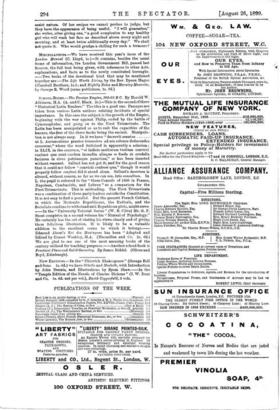ScnooL-Booxs.—The Foreign Empire, 200-60 B.C. By Harold W. Atkinson, M.A.
(A. and C. Black. 2s.)—This is the second of three " Historical Latin Readers." The idea is a good one. Passages are taken from various Latin authors relating incidents of special importance. In this case the subject is the growth of the Empire, beginning with the war against Philip. ended by the battle of Cynoscephalae, and going on to the First Triumvirate. The Latin has been manipulated so as to suit the capacities of the learner, the first of the three books being the easiest. Manipula- tion is not always easy. In it we have " decrevit senatus ut L. Aurunculeius praetor triumviros ad eos colonos deducendos crearetur," where the word italicised is apparently a solecism ; in XLIX. in the sentence, " ei indicio multorum testium convicti confessi que stint caedem incendia aliaque se foeda et crudelia facinora in cives patriamque paravisse," so has been inserted without warrant. Sallust has not got it, and for the good reason that it could not follow "convicti confessi que," though it would properly follow confessi did it stand alone. Sallust's decretum is altered, without reason, as far as we can see, into consultunt. In L. the pupil is referred to the " three Consuls of 1800 in France, Napoleon, Cambaceres, and Lebrun" as a comparison for the First Triumvirate. This is misleading. The First Triumvirate was a combination of three party leaders outside the Constitution. It is not easy to find a parallel. But the present French Cabinet, in which the Moderate Republicans, the Radicals, and the Socialists combine to withstand anti-Republican plots, might serve —In the " University Tutorial Series " (W. B. Clive) Mr. G. F. Stout completes in a second volume his "Manual of Psychology." He certainly has the art of stating his views clearly and of giving them felicitous illustration. It is likely to be a valuable addition to the excellent series to which it belongs.— Edmond About's Rot des Montagnes has been " Adapted and Edited by Ernest Weekley, MA. (Macmillan and Co. 2s. 6d.) We are glad to see one of the most amusing books of the century utilised for teaching purposes.—Another school-book is Practical Plane and Solid Geometry. By James Riddel. (Oliver and Boyd, Edinburgh).


































 Previous page
Previous page